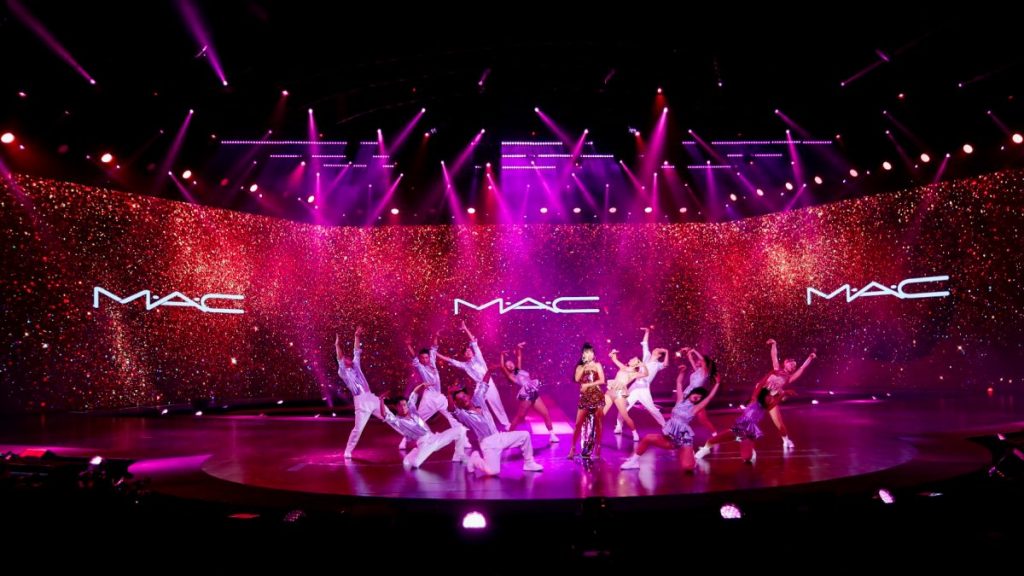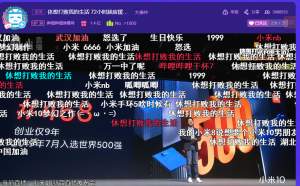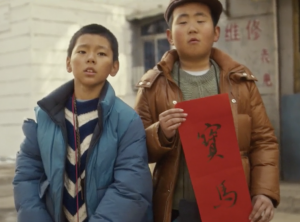
Singing, dancing and makeup at Alibaba’s Singles’ Day launch show
China’s November 11 Singles’ Day (aka “Double 11”) epitomizes the merger of commerce and content that is taking over how brands do business in what is soon to be the world’s largest consumer market. Taylor Swift is among the celebrities who will take part in Alibaba’s live entertainment extravaganza on the eve of Singles’ Day next month, which will feature a variety of performances broadcast across multiple TV channels and other platforms to stir up consumer sentiment for the biggest day of sales in the world.
Last week, Alibaba, the e-commerce giant behind the original concept of turning Singles’ Day into a major shopping festival, launched pre-sales for the annual event with a two-hour event dubbed a fashion show — but in reality it was much more than models strutting down a catwalk. Celebrity performances supported the displays of consumer goods and tech brands along with designer labels such as Burberry and Polo Ralph Lauren, as new songs and new products were debuted.
It was the first time that a broader range of non-fashion brands participated in the kickoff event. Procter & Gamble brought virtual idol Luo Tianyi onstage for an AR-powered performance to promote its Whisper feminine-hygiene brand, while Johnnie Walker showcased its “Game of Thrones” limited-edition whiskies with a troupe of dancers.
“We were looking for an innovative but also vibrant, stylish way to introduce whisky and the Johnnie Walker brand to the younger millennials in China,” said Jeff Lin, e-commerce director of Diageo China, which owns Johnnie Walker.
Alibaba said the show was designed with the live viewing experience in mind, and it included augmented-reality effects that could only be seen on smartphones. It was broadcast live across 17 platforms including Youku (Alibaba’s video-streaming service), Weibo, Douyin, and Bilibili, up from 10 channels last year, reaching a wider audience across the country.
“We love double 11 because we believe in the power of leveraging this very unique moment to touch millions and millions of young Chinese consumers,” said Amy Yang, managing director for Greater China for Levi Strauss & Co., which introduced a new collection for the event.
A number of strategies are being deployed to help brands boost sales this year, including the following:
- As the new products came up on screen during the show, Alibaba’s “See Now, Buy Now” function enabled viewers to make purchases in real time. It also integrated social commerce features that allowed viewers to see which products were trending and how many others were buying them, adding to the impulse to spend.
- The launch event was accompanied by a wave of celebrity endorsements and livestreaming activity with top influencers, including Viya and Li Jiaqi. The two of them alone brought in a combined 60 million viewers to their late-night launch broadcasts. Altogether 100,000 hosts conducted livestreams (a fifteen-fold increase from last year), with 17,000 brands involved.
- Special 11.11 gift sets are being promoted as a bigger draw this year. During the launch event, eleven brands — among them Origins, L’Occitane, and Kanebo — unveiled special edition packaging at the show, a preview of the more than 240 custom gift sets that will be available this year, more than twice as many as last year.
- Brands have been leaning on their celebrity ambassadors to help promote sales through limited edition products and by offering gifts with purchases such as celebrity-themed poster, stickers, and calendars.
- Collaborations are key, with established brands such as Levi’s and MAC collaborating with local companies to create products exclusive to this year’s Singles’ Day shopping event.
This year marks the 11th year since Alibaba began its Singles’ Day sales promotions, and the company is planning for a significant increase in activity. An estimated 200,000 brands are participating, including 22,000 from overseas, with a million new products on offer. Alibaba says it expects more than 500 million consumers to take part in the shopping frenzy, up from roughly 400 million last year, with the growth in numbers largely driven by customers from lower-tier markets. Singles’ Day revenues have increased markedly over the past several years and exceeded $30 billion last year, up nearly 30% from 2017.
The initial consumer response this year has been robust. Estee Lauder, for example, reportedly sold RMB 500 million ($70.7 million) worth of products within the first 25 minutes of the pre-sale period, more than its full-day sales during the main Singles’ Day event last year.
The Singles’ Day mania is not limited to Alibaba either, as rivals such as JD.com, Suning and Pinduoduo have also launched massive sales promotions that will culminate on November 11. However, one cause for concern among brands and consumers regards the allegations flying of merchant exclusivity requirements being imposed by the major platforms, an issue that is being played out in courts.






